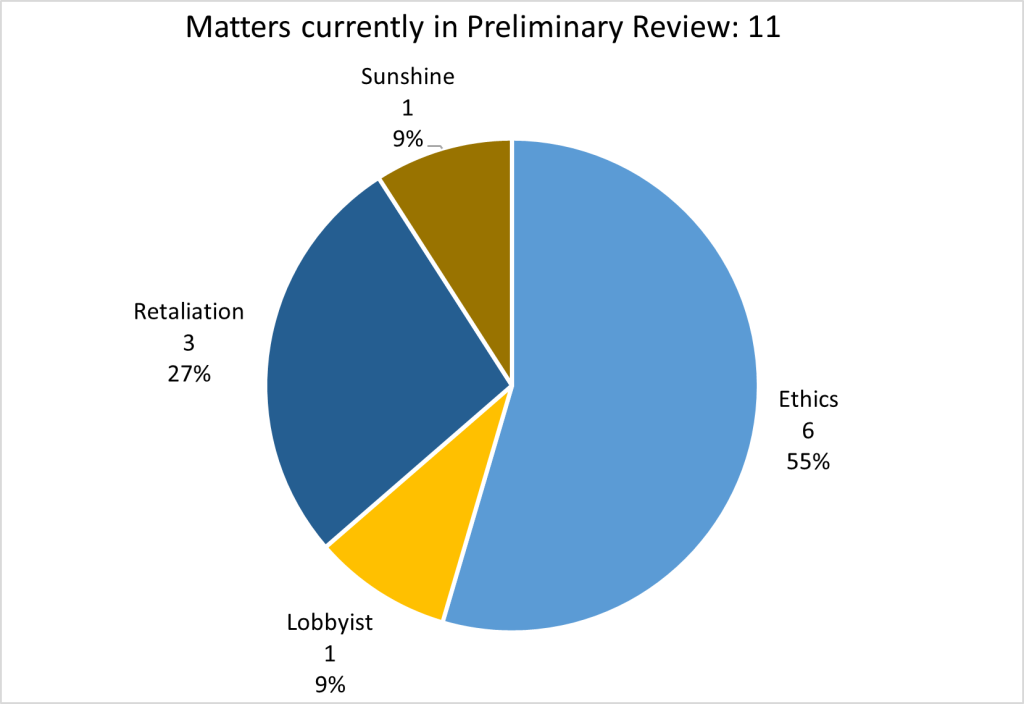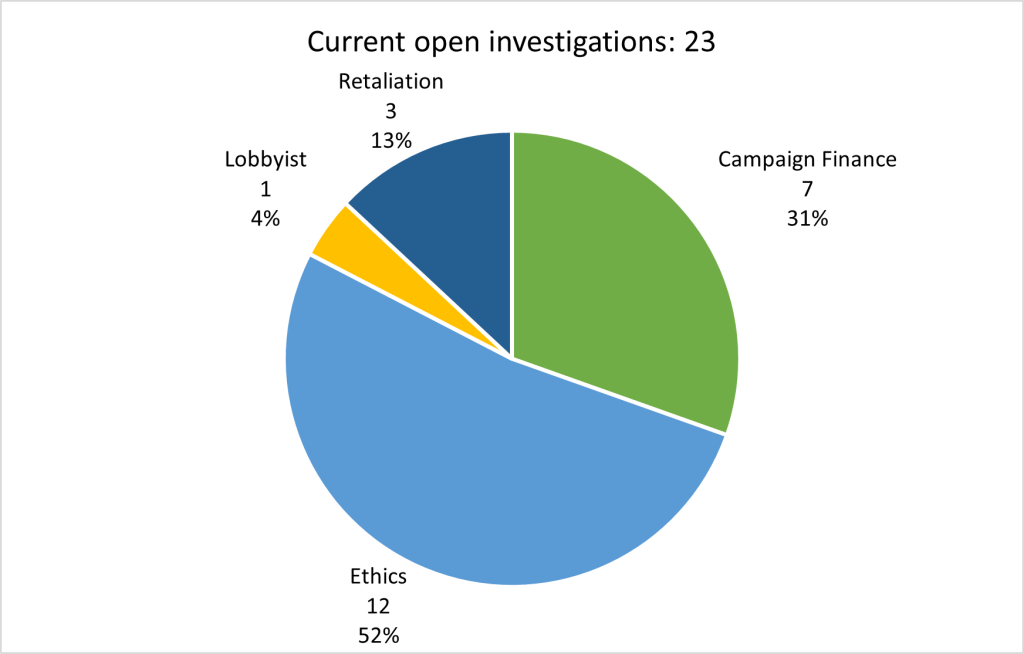To: Members of the Ethics Commission
From: Patrick Ford, Director of Enforcement
Subject: Agenda Item 6: Quarterly Enforcement Report
Summary and Action Requested
This report provides general programmatic updates and data about the cases handled by the Commission’s Enforcement Division.
No action is required by the Commission, as this item is for informational purposes only.
Background
The Commission’s Enforcement Division is responsible for investigating violations of state and local laws relating to campaign finance, lobbying, conflicts of interest, governmental ethics, and whistleblower protection. Enforcement matters are initiated both in response to complaints the Division receives from members of the public and by the Director of Enforcement based on information contained in public records, media reports, and other sources.
All enforcement matters are first examined through the preliminary review process, which assesses whether there is reason to believe that a violation of law within the Commission’s jurisdiction has been committed. Matters will be dismissed in preliminary review if they are outside of the Commission’s jurisdiction, lack sufficient evidence to support further investigation, do not allege violations of the law, pertain to conduct that has already been investigated or resolved, or other similar bases that indicate an investigation would not serve the interest of justice.
Matters that are not dismissed in preliminary review are opened as investigations. The Enforcement Division seeks evidence through the investigation that would indicate whether a violation of the law has been committed. This may include interviewing witnesses and respondents, reviewing documents, and issuing subpoenas when necessary. Details about any matter that is opened as an investigation are shared with the City Attorney’s and District Attorney’s offices so that those offices may determine whether they wish to pursue civil or criminal penalties, respectively.
If the Enforcement Division finds evidence indicating that a violation of the law has been committed, it will seek to resolve the matter by securing penalties from the respondent in one of two ways. First, the respondent may enter into a stipulated settlement agreement with the Commission in which the respondent admits to violating the law, agrees to pay a penalty, and may need to take remedial action such as filing a missing disclosure form. Alternatively, the Enforcement Division may initiate an administrative hearing process before the Ethics Commission.
Cases Resolved
Fiscal Year 2023
So far in Fiscal Year 2023 (July 1, 2022 – June 5, 2023), the Enforcement Division has concluded a total of 153 enforcement matters. Ten of these matters resulted in stipulated settlements approved by the Commission. In total, these settlements represented penalties of $68,795. An additional proposed stipulation is presented as Item 7 on this month’s Commission meeting agenda.
Cases In Progress
So far in FY23, 97 enforcement matters have been initiated. The majority of these (81) began from complaints that the Commission received from the public, but this also includes 13 matters that the Division initiated based on media reports, observations in public disclosures, independent research, findings from audit reports, and interactions with regulated persons. Two matters were initiated based on referrals from the Controller’s Whistleblower Program, and one was initiated based on a referral from the District Attorney’s Office. Some of these matters initiated in FY23 remain in progress while others have already been resolved.
In total, 34 matters are currently in progress, including matters that were initiated during FY23 and matters that were initiated in prior fiscal years. Of these matters, 11 are in preliminary review, and 23 are open investigations.
The current cases in progress are broken down by program area in Charts 1 and 2 below.
Chart 1 – Matters in Preliminary Review by Program Area

Chart 2 – Open Investigations by Program Area

Four of the 23 open investigations four (17%) are currently more than two years old. This is down from the time of the last Enforcement Report in March, when six of the 44 investigations (14%) were more than two years old, and from May 2022, when 12 of 48 investigations (25%) were more than two years old. This reduction reflects the Division’s ongoing focus to resolve older cases and to timely address newer cases before two years has elapsed. The Division continues to work toward the goal of resolving all cases within two years, in accordance with the Division’s case management protocols. However, there are a variety of reasons a matter might not be resolved within two years, including respondents pursuing all available due process rights, respondents or other sources not readily releasing evidence, complex factual investigative work, coordination with another law enforcement agency, and investigative holds requested by the District Attorney or City Attorney.
At this time, 3 of the cases that are more than two years old are either in the administrative hearing stage or are in the final stages of settlement negotiations. The fourth case would be resolved through the stipulation presented as Item 7 at this Commission meeting. The Division anticipates resolving each of the remaining three cases during FY24, whether through settlement or an administrative hearing. The Division also anticipates that, based on current caseloads and practices, no additional cases will surpass two years during FY24. This is a milestone for the Division because all cases moving forward will be resolved in less than two years, a goal that was identified roughly two years ago. The Division’s quarterly report will no longer include information about cases that are more than two years old.
FY23 Initiatives
During FY2022-23, the Division undertook a number of initiatives to increase the Commission’s enforcement capacity and refine and standardize processes. This work was done in order to better conduct thorough, high-quality investigative work, develop more high-impact cases, and achieve more efficient case resolutions. The main initiates undertaken were:
- Launch of New Case Management System – The new system was fully launched on February 24th. The system integrates case data tracking with case document management, so that only one system need be used (previously two systems were needed to accomplish tracking and document management). The system also provides for significantly expanded case data tracking, allowing for faster and more thorough communication between investigators who are collaborating on a case and provide a more detailed picture of the current status of each case.
- Streamlining Preliminary Review – The Enforcement Division made preliminary reviews more efficient and timely by establishing benchmarks for preliminary review completion, using case tracking data to better monitor the status of preliminary reviews and balance investigator workloads, and by prioritizing more complex and important cases that will require more time to conduct the review. Another significant factor in reducing preliminary review time has been the greater number of investigators on staff during the last two fiscal years. Through these methods and increased staff, the Division has been able to significantly reduce the amount of time taken on average to complete preliminary reviews.
- Probable Cause Proceedings and Administrative Hearings – In order to more fully provide for the effective resolution of enforcement matters, the Division created the Enforcement Hearing Guidebook that summarizes the laws governing the Commission’s probable cause process and hearings on the merits. The purpose of the resource is to assist the Commission and the public in understanding the legal processes in place for the Commission to consider the evidence in a case and determine whether a violation has occurred. These processes are core features of the Commission’s role as an administrative enforcement body, a role that was established in the City Charter when the Commission was first formed. The guidebook, which was published to the commission’s website May 1st, will help guide the administration of hearings moving forward.
- Developing Investigator Specializations – A major focus of the Division’s work this year has been developing specializations within the team. This is true of both program areas and functions. Investigators have developed expertise in the specific areas of law administered by the Commission through case work and training. Thanks to the expanded number of investigators, cases can now be assigned in many instances to an investigator that has handled similar cases in the past and who has particular expertise in the laws at issue. Additionally, investigators now team up on cases, with one investigator leading the investigative work and one leading the steps involved in pursuing liability in the case, such as settlement negotiations, probable cause, and hearings on the merits. This approach has allowed for further skill specialization and more efficient case resolution.
- Proactive Enforcement – The Division has begun to increase its proactive enforcement work, which is when investigators initiate enforcement matters without receiving a complaint. The Charter provides for this proactive work to take place, and it is an important way to ensure that violations that are apparent from disclosure filings, public records, or media reports are investigated appropriately. Refining, standardizing, and expanding this aspect of the Division’s work will be a major focus of FY24.
- Refining and Documenting Investigative Protocols – Another major focus this fiscal year has been refining and documenting the protocols followed by the Division when investigating cases. Although the Division has always followed protocols, the process of refining and documenting them more thoroughly has allowed the expanded team to effectively collaborate and conduct their work in a standardized way.
FY24 Initiatives
Building on the progress achieved in FY23, the Division will undertake new initiatives in FY24 that will further expand the Commission’s enforcement capacity and increase the variety, complexity, and volume of cases handled by the Division. During the ongoing project to develop Performance and Appraisal Reports (PPARs) for Commission staff, the Enforcement Division will identify the primary initiatives to be undertaken.
Commission input on goals and priorities for the Enforcement Division in FY24 are invited and can be shared at a Commission meeting or sent directly to Staff. Staff are also available to meet with individual commissioners to discuss goals for FY24. The Enforcement Division is grateful for the Commission’s support in FY23 and looks forward to continuing the Commission’s important work in FY24.